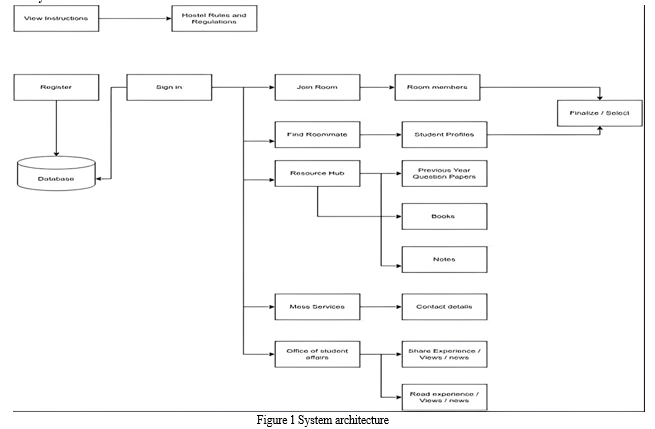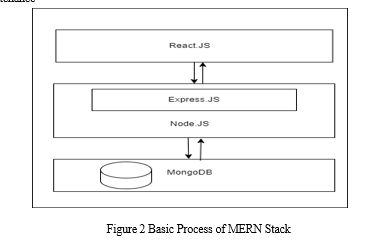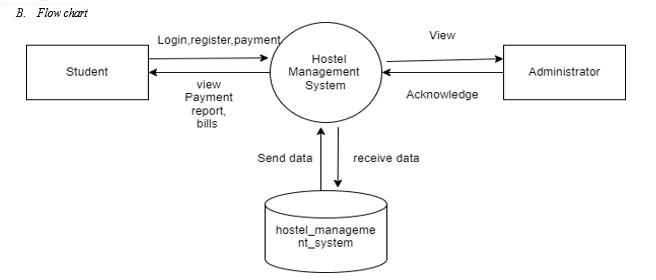Ijraset Journal For Research in Applied Science and Engineering Technology
- Home / Ijraset
- On This Page
- Abstract
- Introduction
- Conclusion
- References
- Copyright
Zeal Nexus - Student Abode
Authors: Monika Patil, Snehal Pawar, Khadija Chichkar, Shraddha Kamlekar, Roshni Parate
DOI Link: https://doi.org/10.22214/ijraset.2024.62582
Certificate: View Certificate
Abstract
Effective and thorough processes are critical to the successful operation and management of hostel facilities in the field of hostel management. An effective hostel administration system called Zeal Nexus was created. to use the MERN stack technology to meet these goals. Scalability, usability, and integration possibilities are frequently hampered by the complexity of the current hostel administration systems. These difficulties may make it more difficult to manage hostel operations effectively, which could have an impact on both resident satisfaction and administrative effectiveness. We suggest building the Zeal Nexus, a cutting-edge, comprehensive hostel management system that makes use of the MERN stack—MongoDB, Express.js, React, and Node.js—in order to address these problems. This potent technology stack will be used in our project to create a scalable, responsive, and intuitive Platform. It simplifies the administration of hostels. A wide range of tools for handling resident data, room assignments, maintenance requests, and financial transactions will be available through the Zeal Nexus, all inside a single, easily navigable interface.
Introduction
I. INTRODUCTION
The difficulties in accessing and using standard management software tools provide serious hurdles in the field of hostel administration. The main goal of this project is to create Zeal Nexus, a cutting-edge hostel management system that connects the complex features of current software programs and the needs of both administrators and residents in terms of accessibility.
One major challenge in the existing environment is the lack of an integrated, user-friendly interface designed with hostel management in mind. In order to handle various software systems, users must not only have a thorough awareness of hostel operations but also possess superior technical abilities. Administrators are prevented from effectively utilizing the advantages of digital hostel management by this twofold need, which creates an exclusionary barrier and prevents them from having to deal with the intricacies of several disjointed systems.
Building a comprehensive hostel management system with the help of the MERN stack—MongoDB, Express.js, React, and Node.js—is the ambitious task at hand. Starting from scratch is required for this project, unlike building upon an existing foundation. Although starting from scratch might seem intimidating at first, it also offers a rare chance to carefully customize the system to the particular requirements of both hostel managers and residents. This proactive strategy makes it easier to create a system that seamlessly complements the intended user experience and provides a smooth and efficient interaction. In order to make an informed strategic decision regarding this project, it is essential to examine current research and technology frameworks, drawing conclusions and knowledge from previous efforts. In order to accomplish this, we have thoroughly examined important research papers and case studies that touch on the areas of hostel user interface design, software development, and management. Zeal Nexus hopes to solve the current issues, provide a unified and intuitive interface, and improve the general effectiveness of hotel management operations by incorporating these insights.
II. MOTIVATION
Recent technological developments have changed many facets of the education industry, including the administration of student housing. Systems for managing hostels are essential for facilitating seamless operations, effective use of available resources, and improved quality of life for residents of educational institutions. However, there are a number of drawbacks to traditional hostel management systems, including laborious manual procedures, a lack of real-time data availability, and a lack of scalability to accommodate changing needs.The realization of these difficulties and the urgent necessity for a cutting-edge, all-inclusive solution to expedite hostel management operations is what inspired us to develop the Zeal Nexus Hostel Management System. By providing a strong, user-friendly platform for administrators, staff, and residents alike, our solution seeks to transform hostel management by utilizing the strength of MERN stack technology, which includes MongoDB, Express.js, React.js, and Node.js.
III. OBJECTIVE
- To Modernize hostel management processes.
- To Enhance user experience for administrators and residents.
IV. METHODOLOGY
A. Requirement collection:
To gather requirements from stakeholders, such as administrators, personnel, and residents, conduct a thorough study.
B. Design and Development:
Create the database schema, user interface, and system architecture. Using the MERN stack, develop the hostel administration system, paying particular attention to aspects like reporting, fee management, and room assignment.
C. Testing and Deployment:
To guarantee functionality, performance, and security, thoroughly test the system. Install the system in a live setting and, if required, combine it with other services or systems already in place.
D. Training and Maintenance:
Hold training sessions for users, get their input, and fix any usability issues. Continued maintenance and support should be given, along with performance tracking, problem fixing, and update implementation depending on user input and changing needs.
V. SYSTEM ARCHITECTURE
A. System Architecture

The hostel management system will leverage the MERN stack, a robust and popular combination of technologies:
- MongoDB: A NoSQL document database that offers flexibility and scalability for storing hostel data like rooms, residents, bookings, fees, and maintenance records.
- Express.js: A lightweight Node.js web framework that facilitates the creation of APIs (Application Programming Interfaces) for managing data requests and responses between the front-end and back-end.
- React.js: A JavaScript library for building dynamic and interactive user interfaces (UIs) for the hostel management system.
- React's component-based architecture promotes code reusability and maintainability.
- Node.js: A JavaScript runtime environment that executes server-side code, enabling the back-end logic to handle data processing, API interactions, and authentication.
a. Components and Interactions
- Front-End (React.js):
Residents and staff will interact with the system through a web interface built with React.js.
Components will handle user login, room availability checks, booking requests, fee management, maintenance requests, and communication features. React's state management libraries like Redux or Context API can be used to manage application state and data flow efficiently.
- API Layer (Express.js and Node.js):
Express.js will be used to create RESTful APIs for CRUD (Create, Read, Update, Delete) operations on hostel data in MongoDB. Node.js will handle server-side logic, data validation, authentication, and interaction with the MongoDB database using a Node.js Object Data Mapper (ODM) like Mongoose for seamless data modeling and querying.
Implement robust error handling and middleware to ensure secure and reliable API interactions.
- Database (MongoDB):
MongoDB will store hostel data in a flexible schema that can accommodate future growth and changes.
Collections (tables) will be defined to store residents (with attributes like name, contact information, room assignment), rooms (including type, availability, and amenities), bookings (with resident ID, room ID, dates, and payment status), fees (including types, due dates, and payment history), and maintenance requests (with details, status, and assigned personnel).
- Security Considerations:
Implement user authentication and authorization with techniques like JWT (JSON Web Tokens) to restrict access to sensitive data based on user roles (resident, staff, admin).
Secure communication between the front-end and back-end using HTTPS (Hypertext Transfer Protocol Secure) to encrypt data transmission.
Sanitize user inputs to prevent SQL injection attacks and other vulnerabilities.
- Deployment:
The system can be deployed on a cloud platform like Heroku, AWS (Amazon Web Services), or Google Cloud Platform for
scalability and easy maintenance


The system Flowchart consists of the following steps:
- Student Interaction:
The flowchart shows how students interact with the hostel management system. They access the system through a user-friendly interface (such as a web application built using React.js). They can perform actions like room booking, fee payment, and maintenance requests.
2. Administrator Interaction:
Administrators have access to additional functionalities compared to students. They use the system to manage room allocations, handle fee collections, process maintenance requests, and generate reports. Administrators interact with the system through an admin dashboard built using React.js and Express.js.
3. Database Interaction:
The flowchart illustrates how both students and administrators interact with the database, which serves as the backend of the hostel management system. The database (implemented using MongoDB) stores information such as student details, room allocations, fee records, maintenance requests, and other relevant data. Both students and administrators perform CRUD (Create, Read, Update, Delete) operations on the database to retrieve and update information as needed.
VI. APPLICATIONS
- Increasing Administrative Effectiveness: Based on MERN stack technology, the Zeal Nexus hostel management system streamlines administrative responsibilities such resident registration, room assignment, and fee administration. Zeal Nexus streamlines record-keeping, avoids errors, and reduces burden by automating these procedures. This frees up administrators to concentrate on resident services and strategic planning.
- Improving Resident-Administrator Interaction: Residents gain from an easy-to-use platform that allows them to contact administrators, view information, and make maintenance requests. Easy navigation is ensured by the React-based interface, and resident satisfaction is increased by features like direct communication channels and real-time maintenance information.
- Simplifying Financial Management: Zeal Nexus ensures accurate reporting of transactions such as fee collection and expenses by providing powerful financial tracking with MongoDB connection. Secure backend processing for instantaneous financial insights is provided by Node.js and Express.js.
- Simplifying Maintenance: Zeal Nexus makes it easier for residents to submit maintenance requests, which are promptly attended to by maintenance personnel. This streamlines maintenance reporting and tracking. The hostel infrastructure quality is improved by the efficient handling provided by the Node.js and Express.js backend.
- Improving Communication: Zeal Nexus enables direct announcements and task assignments, which promotes efficient communication between administrators and residents. User-friendly communication tools are ensured by React frontend, which boosts coordination and operational effectiveness.
- Ensuring Security and Privacy: Zeal Nexus uses strong authentication and encryption methods driven by Node.js to protect user data. Secure data communication protocols and MongoDB encryption promote trust while safeguarding resident data.
VII. RESULTS
- Streamlined Administrative Operations: As a result of the project's implementation, administrative duties like room assignment, resident registration, and fee administration are automated. As a result, administrators have less manual labor to do, which reduces errors and guarantees more effective record-keeping.
- Improved User Experience: The hostel management system's user interface and functionality have been enhanced for both administrators and residents. Higher levels of happiness, more engagement, and more seamless system interactions are the outcomes of this.
- Improved Collaboration and Communication: The system's collaboration capabilities and efficient communication tools let administrators, employees, and residents coordinate more effectively. Task delegation, information exchange, and general operational effectiveness all improve as a result.
- Enhanced Security and Privacy Measures: The protection of user data and privacy is ensured by the deployment of strong security methods. As a result, users and other stakeholders are more likely to trust the hostel management system's dependability and security.
- Decrease in Human Errors and Manual Workload: Task automation lessens the need for manual intervention, which minimizes human error and raises the general accuracy of hostel management procedures.
VIII. FUTURE SCOPE
Future plans for the MERN Stack technology project's hostel management system include possible upgrades and extensions that enhance the user experience, usefulness, and efficiency even more. This could entail incorporating extra features like blockchain technology for safe transactions, IoT-based sensors for facility monitoring, mobile applications for resident involvement, AI-driven analytics for predictive maintenance, and smart room allocation algorithms. Furthermore, the system can be expanded to handle bigger hostel facilities or modified for application in other lodging sectors like hotels or dorms. In order to meet the changing needs of hostel administration in the future and to meet the diverse needs of its users, the system will need to be updated and optimized on a regular basis.
Conclusion
In conclusion, a hostel management system designed to transform hostel operations and based on the MERN stack. Making use of Express.js, MongoDB, Zeal Nexus provides administrators and residents with an effective, scalable, and user-friendly solution using React and Node.js. Zeal Nexus\'s cutting-edge design and features make administrative duties easier, boost resident satisfaction, and increase operational effectiveness. The system offers real-time updates, simplified maintenance management, and safe data handling thanks to its versatile MongoDB database, robust Node.js and Express.js backend, and dynamic React-based UI. All things considered, Zeal Nexus fills the gap between sophisticated hostel management requirements and easily available software solutions, promising to revolutionize hostel operations by democratizing access to high-tech management tools and encouraging cooperation and creativity.
References
[1] 1) S. Agrawal, S. Rastogi and S. Trivedi, \"Cloud Based Hostel Facility Automation System,\" 2023 International Conference on Computational Intelligence, Communication Technology and Networking (CICTN), Ghaziabad, India, 2023, pp. 228-234, doi: 10.1109/CICTN57981.2023.10140316. [2] H. P, K. K. K, S. S. R and M. S, \"Hostel Management,\" 2022 1st International Conference on Computational Science and Technology (ICCST), CHENNAI, India, 2022, pp. 71-73, doi: 10.1109/ICCST55948.2022.10040481. [3] T. Nandanwar, P. Bahutule and R. Buddala, \"A Study on Shift towards Digitization of Hostel Room Allotment for a University,\" 2020 International Conference on Emerging Trends in Information Technology and Engineering (ic-ETITE), Vellore, India, 2020, pp. 1-4, doi: 10.1109/ic-ETITE47903.2020.117. [4] P. Bagda, K. Kumar, S. Rajvanshi, A. Jain and R. Buddala, \"A study on Shift towards Digitization of Approval of Permissions in a University,\" 2020International Conference on Emerging Trends in Information Technology and Engineering (icETITE), Vellore, India, 2020, pp. 1-4, doi: 10.1109/ic- ETITE47903.2020. [5] S. Wenping and C. Ya, \"Research on the Digital Construction of Local Literature in Public Library : Taking Shaoxing Library as an Example,\" 2020 International Symposium on Computer Engineering and Intelligent Communications (ISCEIC), Guangzhou, China, 2020, pp. 196-199, doi: 10.1109/ISCEIC51027.2020.00049. [6] M. Fanea-Ivanovici and M. -C. Pan?, \"From Culture to Smart Culture. How Digital Transformations Enhance Citizens? Well-Being Through Better Cultural Accessibility and Inclusion,\" in IEEE Access, vol. 8, pp. 37988-38000, 2020, doi: 10.1109/ACCESS.2020.2975542. [7] M. Jiang, J. Liu, L. Zhang, and C. Liu, „An improved stacking framework for stock index prediction by leveraging tree-based ensemble models and deep learning algorithms,? Phys. A Stat. Mech. Appl., vol. 541, Mar. 2020, Art. no. 122272.
Copyright
Copyright © 2024 Monika Patil, Snehal Pawar, Khadija Chichkar, Shraddha Kamlekar, Roshni Parate. This is an open access article distributed under the Creative Commons Attribution License, which permits unrestricted use, distribution, and reproduction in any medium, provided the original work is properly cited.

Download Paper
Paper Id : IJRASET62582
Publish Date : 2024-05-23
ISSN : 2321-9653
Publisher Name : IJRASET
DOI Link : Click Here
 Submit Paper Online
Submit Paper Online

